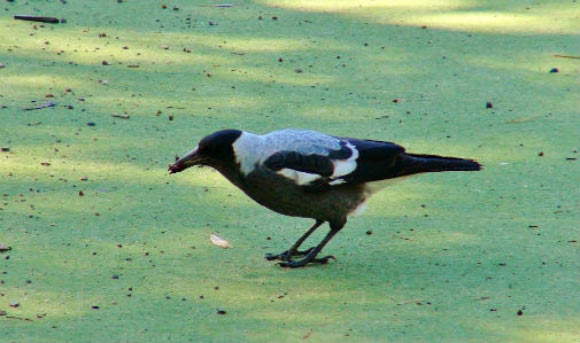Australian magpies ‘dunk’ their food in water before eating, a process that appears to be watched and ‘copied’ by their offspring, say University of York ornithologist Eleanor Drinkwater and co-authors. Their study is published in the journal Australian Field Ornithology.
The Australian magpie (Gymnorhina tibicen) is a medium-sized passerine bird native to Australia and southern New Guinea. It is omnivorous, with the bulk of its varied diet made up of invertebrates.
Food dunking is common behavior in a range of bird species, but has never been observed in this bird before.
Not only was it observed in adults, but the offspring were seen to copy the ‘dunking’ process.
“Food dunking has been seen in at least 25 bird species, particularly in birds that have high cognitive abilities,” Drinkwater said.
“The Australian magpie is an intelligent animal, however we were not expecting to see dunking displayed by this bird.”
“In a separate study on predator-prey interactions between katydids and Australian magpies we were observing a family of magpie at a site near Kosciuszko National Park to see what they would do when offered the insect.”
“We presented the wild magpie with a local insect called the mountain katydid (Acripeza reticulate), which is thought to be distasteful due to the toxins it emits. The adult magpie first dragged and beat the insect on the ground before carrying it to a nearby puddle, dunking it and thrashing under water,” she said.
“The adult male bird appeared to eat the insect under a nearby bush, before returning to take a second insect, repeating the action, but this time leaving the ‘dunked’ insect at the side of the puddle.”
Drinkwater and her colleagues then observed a juvenile bird that had been watching the adult male pick up the discarded insect and mimic the actions of the adult male before eating the insect whole.
“Although more research is needed to understand why the bird dunks its food before eating, our initial assumptions are that it responds to the ‘nasty tasting’ chemical defenses of the insect, by dunking it in water and making it more palatable,” Drinkwater said.
“It was exciting to see that this process was copied by the juvenile bird, suggesting that this behavior could be socially learnt.”
“More research can now be done to determine how common this behavior is from adult birds through to its offspring.”
_____
E. Drinkwater et al. 2017. A novel observation of food dunking in the Australian Magpie Gymnorhina tibicen. Australian Field Ornithology 34: 95-97








